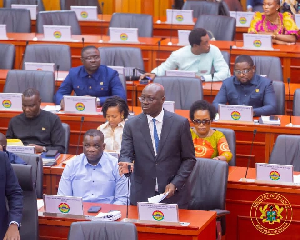It is wrong to assume that untimely death of the late legend Terrence Adjetey, a.k.a. Terry Bonchaka marked? the disappearance of his creative works. Fortunately, his exploits still live on and there is enough evidence to this.
Despite this fact that the late star died in a fatal motor accident two years ago, this year marks the successful release of the albums of his disciples King Ayisoba and Rasta to fulfill Terry’s dread of helping them become stars, a thing he did not live to witness.
King Ayisoba’s album titled ‘Modern Ghanaians’ is already gaining grounds on the Ghanaian music scene and much can also be said of Emmanuel Twum Kwaku aka Rasta, who has released his debut ‘Never Give Up’. The new album, soon to be launched in Takoradi, has 9 songs and all are potential hits.
‘Never Give Up‘, the title track is a fast-paced pop styled song with a soul touching story behind it as narrated by Rasta to the Showbiz. Both Rasta and Terry were involved in the accident that claimed the latter’s life.
Rasta was later accused of having a hand a hand in the late musicians death and had to spend 5 days in police cells while recuperating from injuries sustained during the accident. Shortly after his release, his father also died from a long illness.
27 year old Rasta then resolved to quit pursing his music career since his only hope of hitting the limelight was gone. He said he had a dream in which he saw Terry urging him on to persist in working on his album and this was the driving force behind the release of ‘Never Give Up’.
The album opens with a great hit titled ‘Mintumi’, a mid-tempo medley of reggae and pop beats which is a love song. Rasta sings of his inability to do anything without the company of his loved one. The favourite part of this hit song is where a female vocalist chips in ‘crazy’. She makes me crazy in the chorus.
‘419’ takes the fast paced jama rhythm and a favourite for danceable music lovers. 419 is a very common term used for the practice of fraud, forgery and other forms of corruption. The song says that ‘419’ exists even in relationships. he sings of the unfaithfulness of his lover.
A typical reggae piece which is very soul touching on this album is ‘Nsem’. Rasta obviously talks about the various accusations leveled against him after the death of Terry.
Other good tracks on the album are ‘Asew’, ‘Character’, ‘Me Dofo Pa;, ‘Nsem remix’ and the instrumentals for ‘Never Give Up’.
A native of Nkawkaw, Twum K. Rasta learned how to play the guitar at two local music schools in Accra and started working with a live band group called Kristo Vibes. It was at one of the bands performances at the Oops Night Club in Bubiashie that he met Terry.
According to him, he was very skeptical when Terry approached and proposed that the two should work together. It was during their second meeting at the Gold house Club which had been arranged by Kwame Miki of Kaakyire Music Productions that Rasta decided to work with Terry.
He wrote the choruses of ‘Sweetie’ and ‘Cashaflash’, two of Terry’s hit songs on the ‘Zoozey’ album and they are about to work on another album tilted ‘Dware Me’ when death laid its icy hands on the potential star.
The young musician told Showbiz that on that fateful night, he sensed within him not to go out with Terry because he noticed that Terry’s excitement that very day was unusual. He said Terry threatened not to help him work on his album if he would not accompany him. “I sensed danger but could not foresee the accident”, he said.
Terry had a concept which would have been the first of its kind in the Ghanaian music industry. He recorded 40 songs and had planned to divide them into 10 songs for each album and release 4 albums the same year under different production labels. Nevertheless, these albums are still being worked on and will be released soon.
Rasta’s ‘Never Give Up’ album was recorded at Showtime Africa Studio owned by Zapp Mallet and produced by Mark Mohammed and Mohammed Baako.
Music of Friday, 2 December 2005
Source: ghanamusic.com












